Navigating airport security checks when travelling with babies can often be a daunting task for parents. The challenge often escalates when essential items such as milk powder, water and baby formula are involved, as the Transportation Security Administration (TSA) imposes certain restrictions on carrying liquids in a carry-on bag. Despite these necessary regulations, understanding them ahead of time can significantly streamline the security check process, and ensure a hassle-free journey.
In this blog, details about such necessary protocols and procedures, limitations imposed by TSA on carrying baby water and baby formula, as well as practical tips on packing essentials and preparing for security checkpoints will be discussed thoroughly. This comprehensive guide is specifically crafted to equip parents with useful information, aiding them in effectively planning and packing for their travel with babies. By following these guidelines, parents can ensure a smooth and worry-free travel experience.

Procedure for Screening Baby Water and Formula
When traveling with a baby, packing can be a challenge, especially when it comes to essential items such as milk powder and water. It’s important to note that the Transportation Security Administration (TSA) has specific regulations regarding the number of liquids allowed in a carry-on bag.
Limitations on the Amount of Baby Water and Formula Allowed
When traveling with a baby, it’s important to pre-measure the necessary amount of ready-to-feed formula or powdered formula for the trip. The Transportation Security Administration (TSA) allows reasonable quantities of these items in carry-on bags, as long as they do not exceed 3.4 ounces (100ml) per container.
If you have multiple babies in your family, TSA agents may ask for proof of the need for quantities greater than the recommended 3 or fewer ounces (100ml) of liquid formula or baby food per container. It’s best to be prepared and bring enough baby formula and food for your child’s needs, while also complying with TSA rules.
Remember that you can also bring breast milk on the plane in reasonable quantities. Be sure to inform the TSA agent that you are carrying breast milk and they may need to perform additional screening.
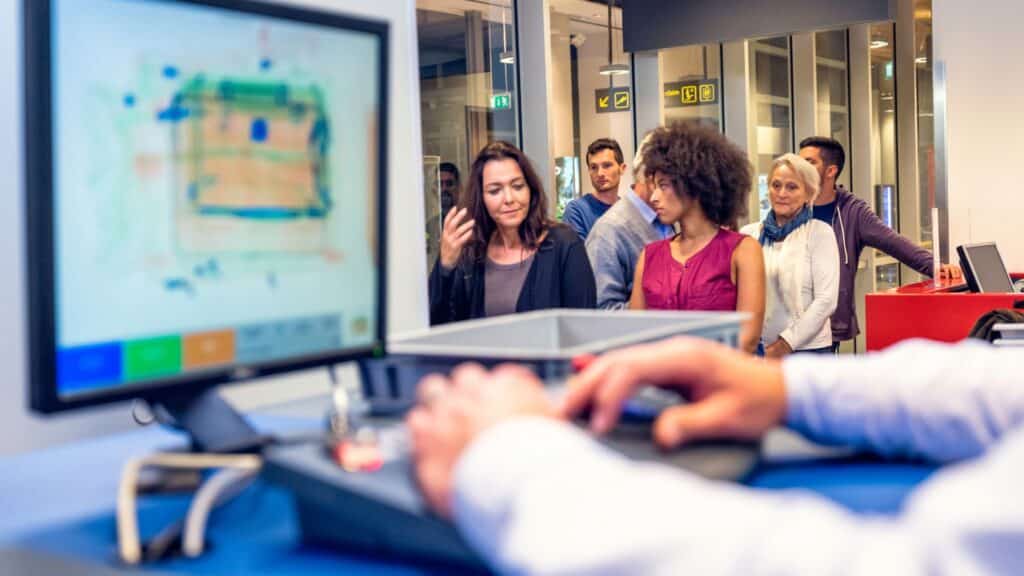
Procedure for Screening Baby Water and Formula
When traveling with baby water and baby formula, there are certain procedures to follow when going through airport security. Here are some tips to make the process go smoothly:
- Inform the TSA officer: Before you get to the security checkpoint, let the TSA officer know that you are carrying baby water and formula. This will allow them to be prepared for a more thorough screening process.
- Separate the items: When screening baby water and formula, make sure to separate them from other accessories and concealed prohibited items in your carry-on bag. All liquid forms must be screened by an X-ray machine.
- Screening process: During the screening process, you will present a bottle of baby water and formula at a designated TSA checkpoint station. The bottles will be screened and sent through an X-ray machine, which can rotate them 360 degrees to ensure all areas are scanned.
- Additional screening: TSA officers may use additional screening methods, such as a physical inspection, hand swipe test, swab test, or explosive trace detection, depending on how the equipment behaves and the information provided by law enforcement.
By following these procedures, you can ensure a smooth screening process for your baby’s food and formula. For more information on traveling with liquids, including baby water and formula, visit the TSA website at www.tsa.gov.
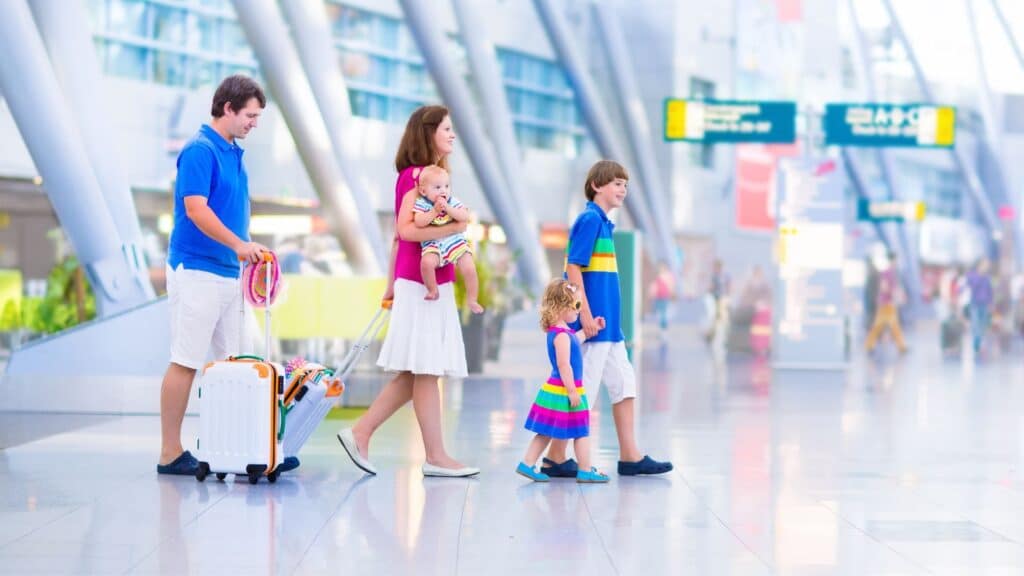
Tips for Traveling with Baby Water and Formula
Water and formula are a must-have for your baby’s well-being but packing them when traveling can be tricky. Here are tips for making sure your little one is well cared for during your next trip:
Packing Essentials for Baby Water and Formula
Packing for your baby is not easy. The first thing to remember is that you want to pack a carry-on bag with all of your essentials, in case you have a layover or lose luggage. You’ll need plenty of formula and water bottles, diapers and wipes, extra clothes and a blanket or two. Sturdy cars are good for entertainment on the plane, but don’t forget the plush toys! Airlines have rules about how much stuff you can take on board – make sure to check before going so you know how much things cost.
If your baby requires medically necessary liquids, such as special formula or medication, make sure to pack them in a quart-sized bag to be screened separately from other items in your carry-on baggage. You can also bring hot water in a thermos or ask for boiling water on the plane to mix with powdered formula.
If you’re unsure of how much baby food to bring, plan for at least one full meal per hour of travel time. Consider packing a cooler bag with ice packs to keep any perishable baby food fresh during the trip. When packing powdered formula, make sure to pack formula enough for the entire trip and measure out portions into small containers for easy feeding.
Remember to check with the airline regarding their policies on carrying baby food and formula on a plane, as some may have specific rules or restrictions. With proper planning and packing, traveling with a baby can be a manageable and stress-free experience.
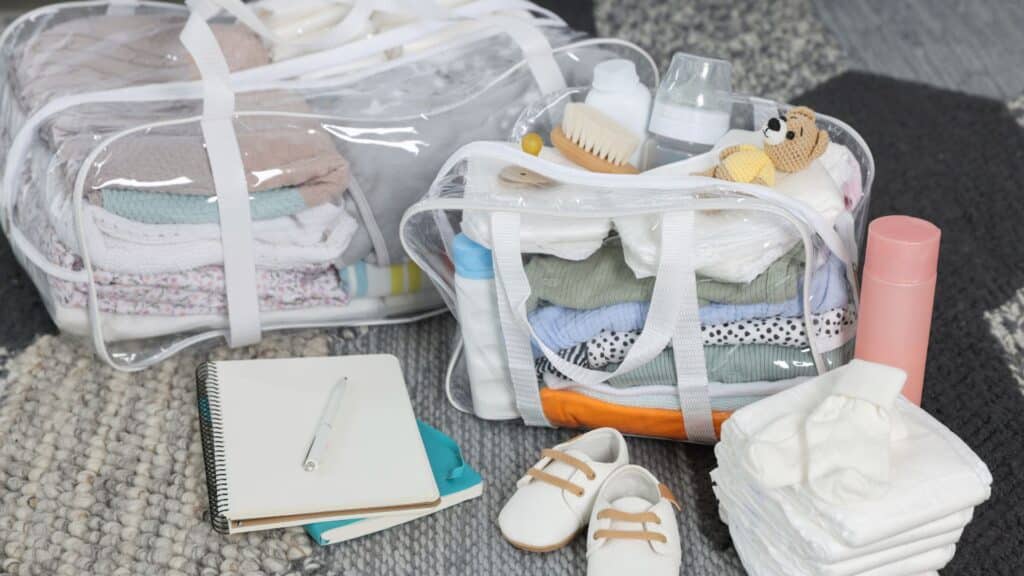
Preparing for Security Checkpoints
Security is of utmost importance when traveling with a baby, so having a clear plan ahead of boarding makes traveling through check-in and security checks as easy as possible. If you will be flying with breastmilk or formula, it is imperative that this is declared at your check-in so that it can be screened out of the cabin baggage and transferred to hold luggage. Make sure you have an empty bottle or baby food container for them to pour into during the flight – no liquids are allowed in hand luggage at any time in the cabin.
Tips for Feeding Baby During the Flight
The first challenge for a parent who will fly with babies or toddlers is how to feed the baby during the flight. There are ways to do that:
1. Always wear your own comfortable clothes on board to allow you to move around easily.
2. Pack a few new toys for your baby, as well as her favorite blanket, pillow and some clothing that can keep her warm throughout the flight.
3. Buy a couple of new books for your child to enjoy during takeoff and landing, which can be just about 30 minutes each way.
4. Practice going through the security check with the stroller or a buggy before you get on board, so you won’t get hassled at the airport.
5. Use headphones or earphones for the baby so she doesn’t have to listen to the sounds of an airplane too close – this could affect their hearing if they are too loud.
6. If you are breastfeeding, make sure to bring breast milk fresh or frozen in freezer packs to ensure your baby has access to their food throughout the flight.
7. If your baby is on formula, pack enough powdered formula or pre-made liquid formula for the entire trip. Don’t forget to bring a container to mix the formula in and bottle liners for easier clean-up.
8. If you need to bring medically necessary liquids like juice or liquid-filled teethers, make sure they are in containers no larger than 3.4 ounces and placed in a quart-sized bag to be screened separately.
9. Consider bringing a cooler bag with frozen gel packs to keep your baby’s food and bottles cool during the flight.
10. If you need boiling water to prepare your baby’s food, you can request hot water from the flight attendants or bring your own tap water and ask them to boil it for you.
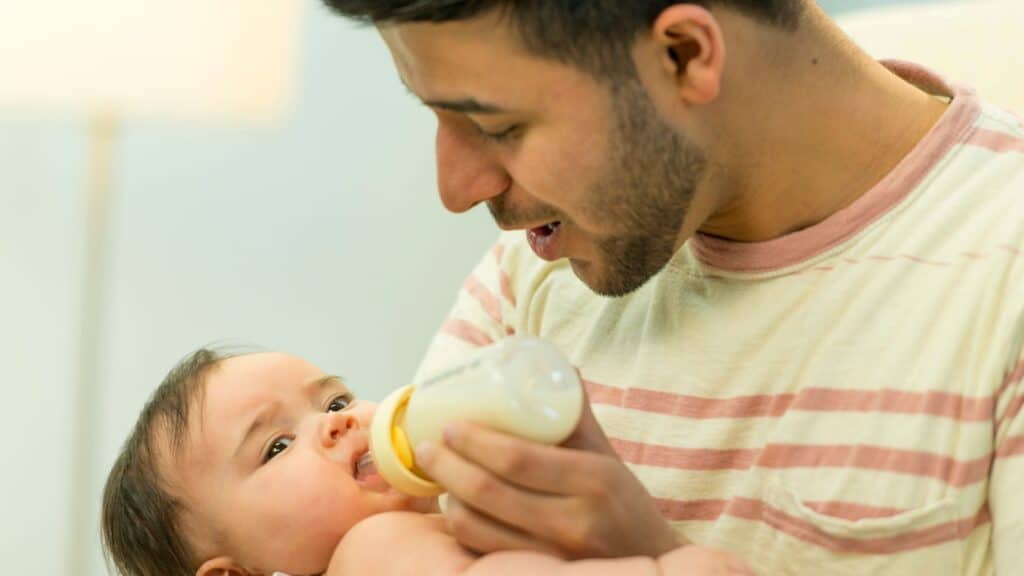
Remember, many parents travel with babies every day and it is possible to have a smooth journey. Just plan ahead, pack smart, and rest assured that you have everything you need to take care of your little one during the flight.
Common Issues and Concerns
There are a number of concerns and issues people have when flying, including:
1. How to Handle Unexpected Delays or Cancellations?
Traveling with a baby and formula requires extra preparation, especially when it comes to unexpected delays or cancellations. Here are some steps you can take:
- Communicate with the airline or travel provider: Inform the airline or travel provider about your situation and ask for assistance in finding alternate arrangements. This may include requesting priority boarding or finding an alternative flight.
- Keep your baby well-fed: Ensure that your baby’s meal schedule is maintained by bringing baby formula or breast milk, along with any necessary supplies such as packed formula, and a diaper bag, and bring ice packs to keep the formula or breast milk fresh. Consider bringing water and gel packs as well to help you prepare your baby’s meal on the go.
- Check your travel insurance: If you have travel insurance, check if it covers any expenses related to unexpected delays or cancellations. This may include coverage for additional baby supplies or medical expenses if your baby becomes ill during the delay.
- Stay calm and patient: Delays and cancellations can be stressful, but staying calm and patient can help you manage the situation better. Remember to take care of yourself and your baby’s needs while you wait for alternative arrangements.
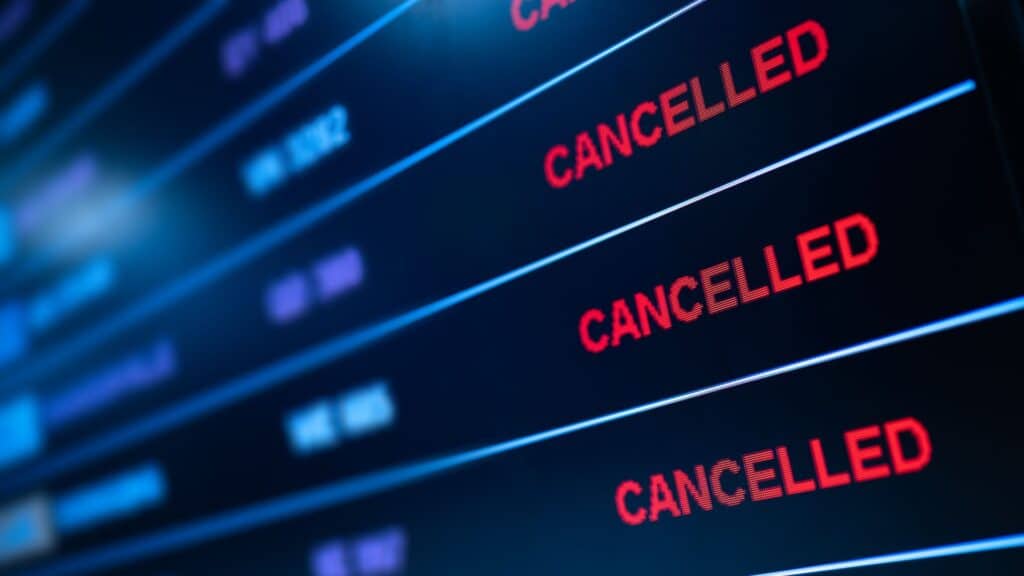
2. What to Do if Baby Water and Formula Are Confiscated?
If your baby’s water and formula are confiscated by airport security, here are some steps you can take:
- Ask for an explanation: Ask the security officer why the baby’s water and formula are being confiscated and if there are any alternatives you can use.
- Have backup supplies: Always carry extra supplies of baby water and formula in case of unexpected situations like this.
- Stay calm: Getting angry or upset may escalate the situation and make it harder to resolve. Stay calm and respectful when dealing with security officers.
- Consider appealing the decision: If you believe the confiscation was unjustified, you can appeal the decision with the airport or TSA.
3. Dealing with Issues of Sanitation and Hygiene?
When traveling with baby water and formula, it’s important to prioritize sanitation and hygiene. Here are some tips:
- Wash your hands: Wash your hands with soap and water before handling baby water and formula.
- Use sterilized bottles: Use sterilized bottles to reduce the risk of contamination.
- Store formula properly: Keep formula in sealed containers and avoid exposing it to sunlight or extreme temperatures.
- Bring cleaning supplies: Carry wipes, sanitizers, and cleaning supplies to clean bottles and surfaces.
- Follow storage guidelines: Follow the manufacturer’s guidelines for storing and preparing baby water and formula to ensure safety and hygiene.
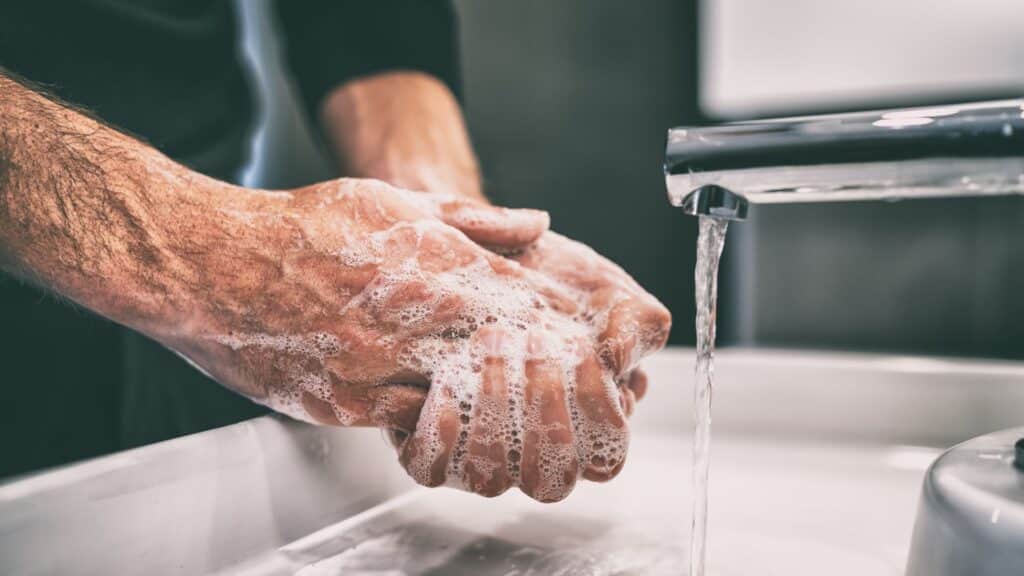
Conclusion
In conclusion, navigating airport security checks when traveling with babies does imply dealing with TSA rules, especially those regarding liquids such as baby formula and water. However, by gaining a better understanding of those rules and preparing accordingly, you can ensure a smoother, less stressful journey for both you and your baby. Remember, these guidelines are not just for the convenience of the airlines or the security agents, but primarily for the safety and comfort of all travelers, including the smallest among us.
It is our sincere hope that this comprehensive guide on procedures, TSA guidelines, and practical tips prove beneficial in your travel planning process. Keep in mind that while traveling with your baby can pose unique challenges, with adequate preparation, these challenges can be effectively addressed, making your journey an enjoyable experience. Remember, the key is to plan smart, pack smart, and remain flexible to adapt to any potential changes or surprises along the way. Happy journeying!
For more information on the TSA liquids rules, including details on what types of liquids are allowed and how to properly pack them, please visit the official TSA website at https://www.tsa.gov/travel/security-screening/liquids-rule.
Let us know in the comments if this article was helpful. We love hearing from you, and we’re always happy to answer questions!



